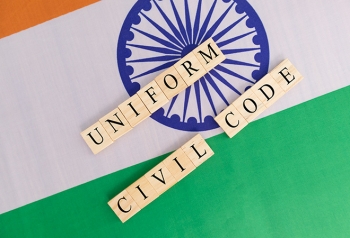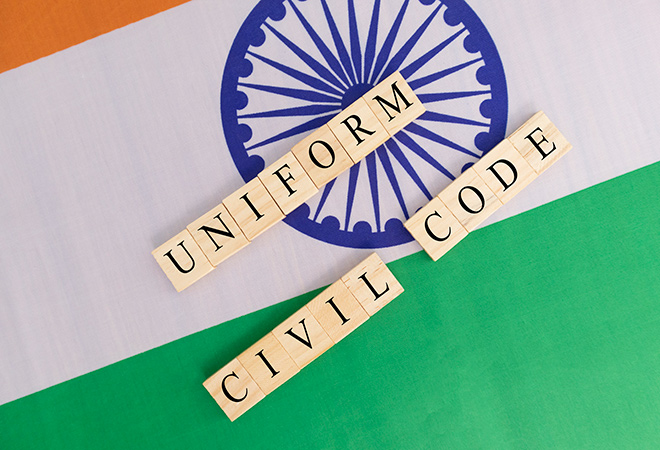
.png) Joseph Maliakan
Joseph Maliakan

The question whether the country as diverse as India with so many different languages, castes, cultures, religions, ethnic and tribal groups needs a common civil code and how desirable it will be to improve the lives of the common people was discussed threadbare in the Constituent Assembly before the matter was adopted as a part of the Directive Principles of State Policy.
Article 44 says: The State shall endeavour to secure for the citizens a uniform civil code throughout the territory of India. The Supreme Court of India has, in a large number of cases, rejected attempts through public interest litigation to seek the issue of writs: (a) praying for the introduction of uniform civil code; or (b) declaring certain enactments relating to family law (alleged to be discriminatory) as unconstitutional.
The court stated at the very outset that the petitions mentioned relating to family laws did not deserve disposal on merits, as the issues involved were matters of policy with which the Supreme Court would not ordinarily have concern. Regarding Religious Freedom, the Supreme Court held that the premise behind Article 44 is that there is no necessary connection between religion and personal law in civilised society (John Vallamattom v. union of India , AIR 2003 SC 2902.)
In Pannalal Bansilal v. State of Andhra Pradesh, AIR 1996 SC 1023, the Supreme Court made the following observations: In a pluralist society like India, in which people have faith in their respective religious beliefs or tenets propounded by different religions or their offshoots, the founding fathers while making the constitution, were confronted with problems to unify and integrate people of India processing different religious faiths, born in different castes, creeds or subsections in the society as a united Bharat.
A uniform law, though it is highly desirable, enactment thereof in one go perhaps may be counter-productive to unity and integrity of the nation. In a democracy governed by the rule of law, gradual progressive change and order should be brought about. Making law or amendment to a law is a slow process and the legislative attempts must be to remedy where the need is felt most acute. It would, therefore, be inexpedient and incorrect to think that all laws have to be made uniformally applicable to all people in one go.The mischief of defect which is most acute can be remedied by the process of change of law in stages.
In 2016, the Ministry of Law and Justice requested the Law Commission to examine matters related to the introduction of Uniform Civil Code for whole of India. The Law Commission in a paper submitted to the Government in August 2018 concluded that "A Uniform Civil Code is neither necessary nor desirable at this stage."
However, the Law Commission after consulting various stakeholders in a paper titled ‘Reforms of Family Law’ suggested reforms in family laws across religions through amendments and codification to avoid ambiguity in interpretation and implementation.
Describing sati, devadasi, triple talaq and child marriage as examples of social evils, the Law Commission observed these practices violate human rights and cannot be allowed under the garb of age-old religious customs.
But for obvious reasons, in the third week of June 2023, the 22nd Law Commission of India invited the public and recognised religious organisations to give their views on the UCC within 30 days. Even before any organisation or the public gave their opinion on the UCC, Prime Minister Narendra Modi, addressing party workers in Bhopal on 27 June, made government's intention to bring in a Bill on Uniform Civil Code before 2024 general elections. In other words, the UCC is nothing but an election agenda.
In a very high pitch address, the Prime Minister bemoaned that the country cannot have separate laws for the people forgetting the fact the country is already governed by the same laws under the IPC, the CrPC and the various laws enacted by the Parliament and the state legislatures. The UCC will, even when brought in, remain a code not a law.
That would mean a single civil code will apply to all people regardless of caste, creed religion or sex regarding marriage, divorce, adoption and inheritance. Consequently existing personal laws based on religions like the Hindu Succession Act (1956 ) and the Muslim Personal Law Act (1937) will be nullified .
But unlike the Fundamental Rights, the Directive Principles of State Policy are not justiciable in a court of law. So the question arises as to how even if a law is enacted, it will be implemented throughout the country. Further the tribal areas in different parts of the country specially central India and North East India already have special constitutional provisions governing them. Obviously a UCC cannot over-ride these provisions.
By bringing in a law on uniform civil code, the Union Government could come into conflict with the states. Goa is the only state in the country which has a Uniform Civil Code in the country. This is the result of Portuguese rule of Goa before its liberation. The Portuguese enacted the Civil Code in 1867 and extended it to Portuguese overseas provinces including Goa in 1869.
The Uttarakhand BJP government, in May 2022, announced its decision to implement a UCC in the State. The Assam Chief Minister Hemant Biswa Sarma has also expressed his support to bring in a Common Civil Code for the State.
In this context the country will be better off to go by the suggestion of the 21st Law Commission. It suggested: “In the absence of any consensus on a uniform civil code the Commission felt that the best way forward may be to preserve the diversity of personal laws but at the same time ensure that personal laws do not contradict fundamental rights guaranteed under the Constitution of India.”
The 21st Law Commission had further pointed out that most countries are now moving towards recognition of difference, and the mere existence of difference does not imply discrimination, but is indicative of robust democracy.